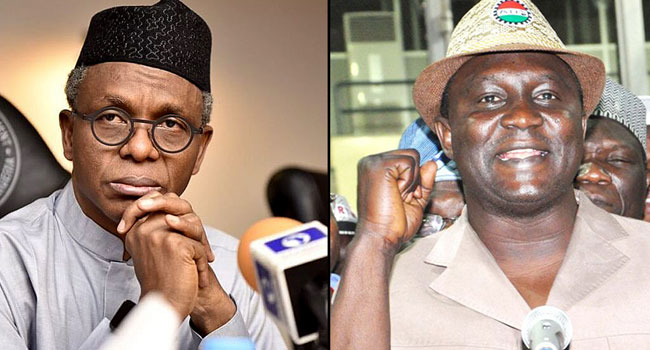
Earlier in the week, the Kaduna state Governor, Nasir El-Rufai, declared Ayuba Wabba, the Nigeria Labour Congress (NLC) President and his colleagues wanted for the strike action in the state and also placed a bounty on them. The protest, now suspended after the federal government’s intervention was a move by the workers against the mass sack of Kaduna workers announced by the state government in April.
“KADUNA UPDATE: Ayuba Wabba & others of @NLCHeadquarters declared wanted for economic sabotage & attacks on public infrastructure under Miscellaneous Offences Act. Anyone that knows where he is hiding should send a message to @MOJKaduna. KDSG. There will be a handsome reward!,” Mr El-Rufai wrote on Twitter Tuesday.
Although Mr Wabba in his response dared the Governor to arrest him for leading a protest, the question of the legality or otherwise of Mr El-Rufai’s declaration continues to raise concerns.
However, checks by POLITICS NIGERIA into extant laws and interviews with legal experts revealed that the Governor, who is an executive member, has no such power to declare anyone wanted.
Miscellaneous Offence Act
The alleged crime, committed by Mr Wabba and his colleagues, is hinged on the Miscellaneous Offence act first promulgated in 1983. According to the law, any person who commits an offence under this Act shall be arrested without warrant by a police officer or customs officer, as the case may be.
Meanwhile, the administration of criminal justice Act 2015 dwells extensively on arrest of suspects. For instance, section 23 of the ACJA stipulates that a private individual can arrest a suspect damaging public property but immediately hand such over to the nearest police station.
How can a person be declared ‘Wanted’
When a suspect is at large, only the judiciary has the powers to issue a public summons, which shall be issued after a suspect fails to honour the warrant of arrest earlier issued by a court.
“Where a court has reason to believe, whether after evidence or not, that a suspect, against whom a warrant of arrest has been issued by itself or by any court or Justice of the Peace, has absconded or is concealing himself so that the warrant cannot be executed, the court may publish a public summons in writing requiring that person to appear at a specific place and a specific time not less than 30 days from the date of publishing the public summons.” section 41 of the ACJA says.
While the state government claimed there was a warrant of arrest against Mr Wabba dating back to 2017 when a similar protest was staged in Kaduna, the police spokesperson in the state could not confirm such.
“I’m not aware of the arrest warrant,” Mohammed Jalige said, directing our reporter to the state officials. Also, the state’s Commissioner for Internal Security, Samuel Aruwan, and Mr El-Rufai’s media adviser, Muyiwa Adekeye, have yet to respond to this newspaper’s enquiries on further details of the arrest warrant and the court that issued it.
They neither picked their calls nor replied to text messages.
As a result, POLITICS NIGERIA cannot confirm if any warrant of arrest or public summons has been issued in the case of Mr Wabba in the past. Such could not have been done recently since the judiciary has been on strike for over 5 weeks.
El-Rufai’s action illegal, Lawyers say
Human rights activist and senior lawyer, Femi Falana, also stated that Mr El-Rufai lacked the powers to make such a declaration. According to Mr Falana, the order of the Governor cannot be enforced because of the unions’ right to participate in peaceful protest amongst other reasons.
“The Miscellaneous Offences Act is not a state statute but a federal enactment. To that extent, if Governor El Rufai has evidence that Comrade Wabba and other labour leaders have contravened any provisions of the Act he is required to lodge a complaint in any of the police stations in Kaduna State.The Governor lacks the power to declare any alleged offender wanted under the Act or any other law whatsoever.
Furthermore, since Comrade Wabba and other labour leaders are entitled to the fundamental right of fair hearing including presumption of innocence,” he said. Citing a previous case, Mr Falana said: “In Benedict Peters v. Economic and Financial Crimes Commission & Anor. (Suit No: FCT/HC/BW/CV/23/2021) of 22nd March, 2018 even though the EFCC had obtained a warrant for the arrest of the Plaintiff the Court held that “But neither the said warrant nor any of those statutes, including the Police Act and the Administration of Criminal Justice Act provide that the 1st Respondent can declare any person who is suspected to have committed an offence, but is evading warrant of arrest as a wanted person, without an order of court first had and obtained.”
In view of the foregoing, we call on the authorities of the Nigeria Police Force and other security agencies to ignore the illegal statement credited to Governor El Rufai. In Eperokun v. University of Lagos (1986) 4 NWLR (PT 34) 162 at 172 the Supreme Court held that “…constitutionally entrenched provisions, particularly those safeguarding individual rights, should not, save in a fascist system, be lightly trampled upon.”
These were also corroborated by Festus Ogun and Garba Abubakar, two legal experts who spoke to this newspaper. Mr Ogun described the action of the Governor as preposterous, saying the NLC President was not in any way out of reach if the state wanted to arrest him.
“The leadership of the NLC is in Kaduna as we speak. He is not a rogue that has been at large. He was at the protest today. If they want to arrest him, there are constitutional channels.
“For Mr Abubakar, the Governor cannot “jump the gun” by proceeding to declare anyone wanted in the media.”
“When there is an allegation, a complaint has to be made. They have to lodge a complaint first. They can lodge it directly – to the Police or indirectly— to the court,” he said.
